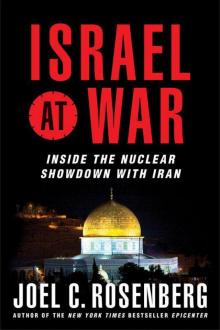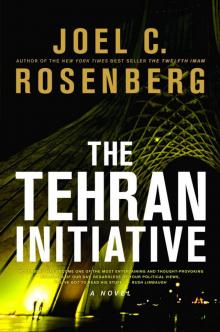- Home
- Joel C. Rosenberg
The Twelfth Imam Page 19
The Twelfth Imam Read online
Page 19
Twenty-four hours earlier, Eva had been consuming an awful lot of his thoughts. He’d been looking forward to going to Starbucks with her, to attending a week of briefings with her, to going into Tehran with her, to getting to know her better. He still was, but now it was complicated. How could he even consider a relationship with her if there was a possibility of reconnecting with Marseille? Then again, was that really a possibility? He hadn’t heard from Marseille in years. Who knew what she wanted to talk about? She could be engaged. She could be married. She could have children. And what was all that about church in her note? Had she become religious? Was that why she wanted him to go to church with her back in Syracuse? It made no sense, but then again . . .
“Mr. Tabrizi, Mr. Tabrizi, over here!”
It took a moment for David to hear the name and realize it was supposed to be his. He turned and saw Eva smiling and waving at him through the enormous crowd in the Dubai International terminal, all waiting for their loved ones just beyond the secure doors. His first thought was that despite being much more modestly dressed than back in Virginia, she looked great, sporting a beautiful green headscarf and a full-length brown dress that covered her legs and her arms. His second thought was that this looked like a woman preparing to head into Iran, not to Starbucks. Nevertheless, he smiled and waved back and was surprised to see her eyes light up with anticipation as they met his.
“Welcome to Dubai, Mr. Tabrizi,” she said, being careful not to shake his hand or have any physical contact whatsoever since they were neither married nor related.
“Thank you, Ms. Fischer. Please, call me Reza,” he replied.
“If you insist. And call me Eva,” she said. “How was your flight?”
He couldn’t begin to tell her. “Too long. But it’s good to finally be here. Do you have a car for me to go to the hotel?”
“Actually, I’m afraid we have a change of plans,” Eva explained, picking up her own suitcase and garment bag.
“What do you mean?”
“You got my text, right?” she asked, handing him his new itinerary. “We’re heading to Tehran.”
“When?”
“Next flight.”
Stunned, David read the paper in his hands. She wasn’t kidding. They were booked on Emirates Airlines flight 975, departing Dubai at 12:10 a.m. and landing in Tehran two hours and ten minutes later. He glanced at his watch. It was already 10:56 p.m. They had to move quickly.
“I don’t understand,” he said as he scooped up his own bags and followed Eva back into a security line. “What’s going on?”
“Last night, the Israelis launched more than four hundred warplanes at Greece in what looks like a massive test run for a strike against Iran,” Eva whispered.
“Four hundred?” David whispered back. “That’s almost half their fleet.”
“Exactly. The Iranians are freaked out.”
“And that’s why we’re going in?”
“Not entirely.”
“Then what?”
“Abdol Esfahani’s office called. He wants to meet us for breakfast.”
Esfahani was a key executive at Iran Telecom and the point man for operationalizing the new contract with Munich Digital Systems. It wasn’t a meeting they could easily blow off, but David wasn’t convinced he and Eva were ready to go into Iran quite yet. Where was Zalinsky? How could he have signed off on such a rapid departure? They were supposed to work here in Dubai for the week. They were supposed to refine their plan, set clear goals, and establish contingencies in case things went wrong, as too often they did. But how much planning could Jack and Eva have actually done without him, given that all weekend she had been with . . . whom?
“So,” he asked casually, “how was Berlin?”
“Uh, great,” she said, hesitating ever so slightly. “But not nearly long enough, you know?”
With that, David realized Eva hadn’t actually been in Berlin. She had come straight to Dubai with Zalinsky. That was fine, of course. She was the boss. She didn’t answer to him. But how and when exactly was she supposed to fill him in on the plan she and Jack had cooked up? They certainly wouldn’t be free to talk on the flight in, and they’d be trailed by intelligence operatives from the minute they hit the ground in Tehran. This was too big of an operation to rush. The stakes were too high. But they were rushing into it anyway. Why?
And then his thoughts shifted to Marseille and his anxiety spiked again. He couldn’t exactly call her from Tehran.
43
Hamadan, Iran
Najjar got home around 2 a.m. and found the lights on.
Sheyda was asleep on the couch with their tiny daughter snuggled beside her. He slipped off his shoes, quietly set his keys on the kitchen table, put a blanket over his wife and child, and stared at them for a while. They looked so peaceful, so innocent. Did they have any idea of the evil rising around them?
He turned off the lights in the living room and kitchen and stepped into the spare bedroom he used for a home office and library. Switching on his desk lamp, he cleared off his cluttered desk and found a stack of books his father-in-law had lent him several months before but that he had been too busy to read. The one on the top was titled The Awaited Saviour. It was written by Baqir al-Sadr and Murtada Mutahhari, both Shia ayatollahs. Taking the volume in hand, Najjar turned to the prologue and began to read.
A figure more legendary than that of the Mahdi, the Awaited Saviour, has not been seen in the history of mankind. The threads of the world events have woven many a fine design in human life, but the pattern of the Mahdi stands high above every other pattern. He has been the vision of the visionaries in history. He has been the dream of all the dreamers of the world. For the ultimate salvation of mankind he is the Pole Star of hope on which the gaze of humanity is fixed. The Qur’anic prophecy of the inevitable victory of Islam will be realized following the advent of the Mahdi, who will fight the wrong, remedy the evils, and establish a world order based on the Islamic teachings of justice and virtue. Thereafter there will be only one religion and one government in the world.
Najjar continued reading throughout the night. The more he read, the more convinced he became that the arrival of the Twelfth Imam and establishment of his caliphate, or kingdom, was imminent. Were not the signs, described by Shia sages throughout the centuries, coming to pass day by day? The world was becoming more and more corrupt. The global economy was in collapse. A great war was being fought between the Tigris and the Euphrates. The land of Taliqan—an ancient name for a region of Afghanistan—was consumed by war and poverty. Terrible earthquakes were occurring in ever-increasing number and intensity. Apostasy was spreading within Islam. Civil wars and uprisings were prevalent.
Najjar was electrified when he read, “The Mahdi is alive. He visits different places and takes an intelligent interest in world events. He often attends the assemblies of the faithful but does not disclose his true identity. He will reappear on the appointed day, and then he will fight against the forces of evil, lead a world revolution, and set up a new world order based on justice, righteousness, and virtue.”
To the very core of his being, Najjar believed these words to be true. He was absolutely convinced that he had seen the Promised One at least twice in his life, first as a child on the day Ayatollah Khomeini had died, and again in Baghdad the day he saw the Iraqi nuclear scientist kidnapped and his family gunned down in the streets. Najjar had prayed every day since that he would have the opportunity to see the Promised One again. But he had never dared tell anyone of his encounters, not even Sheyda, whom he loved more than life. He feared she would think he was boasting or lying or hallucinating or crazy.
But was it really necessary to prepare the way for the Twelfth Imam by building a nuclear weapon, by annihilating Israel and the United States and other enemies of Islam? Dr. Saddaji obviously believed it was. Najjar, too, had once believed that, but now he wasn’t so sure. Worse, he now feared that by authorizing the beheading of a man who had been forced
into the Iranian nuclear program years earlier—a man whose wife and child Najjar himself had seen murdered—Sheyda’s father had become part of the “forces of evil” whom the Promised One was coming to judge. It saddened and sickened him, but what could he do? He couldn’t tell Sheyda. It would shatter her. To whom, then, could he turn?
44
Tehran, Iran
Abdol Esfahani was not a big fish.
In the grand scheme of Iran Telecom’s communications empire, he was a minnow. But at least he was nibbling.
As Iran Telecom’s deputy director of technical operations, Esfahani was in charge of the day-to-day mechanics of turning the company’s ambitious strategic overhaul from concept to reality. He hadn’t negotiated the massive contract between Iran Telecom and Nokia Siemens Networks. Nor had he been involved in the subcontract NSN had inked with Munich Digital Systems. But all of the consultants and technical support teams that NSN already had in Iran ultimately reported to him, as would the MDS teams that were about to arrive in force.
David had no idea what Esfahani wanted to discuss, nor did Eva. He guessed the man simply wanted to look them in the eye, take their measure, and establish clear lines of authority and responsibility before the MDS tech teams arrived. After all, MDS’s role was a critical one: installing state-of-the-art call routers and proprietary software systems capable of handling millions of calls per minute, all of which would also integrate voice, data, and video services through the new fiber-optic and wireless networks NSN was building. The scope of the work was staggering. It was going to be complicated, time-consuming, and expensive. Esfahani no doubt wanted to make sure he was on a first-name basis with the senior Farsi-speaking project managers on the MDS team.
The breakfast meeting was set for seven thirty in the penthouse conference room of Iran Telecom’s headquarters in downtown Tehran. By the time Eva and David—traveling as Reza Tabrizi—landed at Imam Khomeini International Airport, cleared an extensive passport control and customs process, checked into separate rooms at the Simorgh Hotel on Vali-Assr Avenue, showered, changed, and got back into their hired car—followed the entire time by Iranian intelligence agents—they were lucky to make it to the meeting on schedule. With less than five minutes to spare, they sprinted into the main lobby and presented their IDs and a faxed letter of invitation. Only then were they directed to the ninth floor. There they were greeted by a lovely but somewhat-timid young receptionist wearing a black, full-length traditional woman’s cloak known as a chador and a dark green headscarf that not only accented her shy, green eyes but nearly matched the color of Eva’s headscarf as well.
“Welcome to Iran Telecom,” she said, stammering somewhat and unable to make eye contact, even with Eva. “My name is Mina.”
“Thank you, Mina,” Eva said, taking the lead. “It’s good to be here, despite all that traffic.”
“Yes, it’s quite challenging,” Mina said, still not looking at them but rather at the letter of invitation. “Forgive me, but which one of you is Mr. Tabrizi?”
It was an odd question, David thought, given the fact that he was the only man standing there. “That would be me,” he replied.
Mina glanced at him, then looked away quickly. “Are we still waiting for Mr. Fischer?” she asked.
“Actually,” Eva said, “that appears to be a mistake on the invitation. It’s supposed to be Ms. Fischer, not Mr. And that would be me.”
She held out her hand to shake Mina’s. But Mina, startled, didn’t take it.
“Ms. Fischer?”
“That’s right,” Eva said, still holding out her hand.
“There’s no Mr. Fischer?”
“No, just me.” Eva awkwardly withdrew her unwelcome hand, now looking as perplexed as the receptionist.
“You are the project manager for MDS?” Mina asked.
Eva forced a smile. “Yes; is there a problem?”
Mina looked up, stared at Eva for a moment, then looked away again. “Please have a seat,” she said crisply, picking up her phone and dialing. “It will be a few minutes.”
A moment later, Mina hung up the phone, excused herself, and stepped into Mr. Esfahani’s office, leaving the door open a crack behind her. David could hear whispering for a few moments, and then came the explosion.
“What? Are you certain?” yelled a man David figured for Esfahani.
He could hear Mina talking, but she spoke so quietly he couldn’t make out what she was saying.
“A woman?” the man shouted. “They sent a woman? And you let them? Don’t you know how close we are, you fool? Don’t you know how pious we must be? He’s coming at any moment. We must be ready!” Something glass or ceramic crashed against the wall and shattered.
David turned to Eva. This was not good. Esfahani was screaming at the top of his lungs. They could hear the man’s fist slamming into his desk. They could hear his secretary quietly sobbing. They heard him curse her for daring to think that he would ever have a woman running such an important project. He threatened to fire her. “How could you make such a stupid mistake?” he roared. “How could you bring dishonor into this office at such a time as this?” He began cursing NSN and MDS for having the gall to think he would accept a woman as a project manager. And then Esfahani, a thin man—almost gaunt—balding, and red as a beet, stormed out of his office, not stopping to look at either David or Eva. He blew through the reception area and boarded the elevator, and before they knew it, he was gone.
David, barely believing what he had just witnessed, turned to his colleague. Eva was pale. She was so deeply shaken, he wanted to give her a hug. But he could not, of course. Touching a woman who was not his wife, and doing so in public, risked turning the crisis into a full-blown cultural catastrophe. He didn’t know what to do or say to Eva, much less to Mina. The secretary was crying and muttering to herself and trying to clean up whatever had been destroyed in Esfahani’s office. This wasn’t something they trained you for at Langley. But David knew he had to do something to salvage this situation. The stakes were higher than the feelings of these two women. This was the CIA’s only door into Iran Telecom, and it had just been slammed in their faces.
“Go to the car,” he whispered to Eva when he was certain Mina was not looking. “Have the driver take you back to the hotel. I’ll try to salvage this.”
“No, I’m fine,” Eva said curtly, clearly embarrassed but trying hard to regain control.
David didn’t have time to argue. He could tell from Eva’s tone and stiff body language that her shock was turning to anger. But he couldn’t take the risk that she would try to undo the damage and in so doing end up making things worse.
“This wasn’t your fault, Eva,” he whispered back. “But you can’t fix it. Not now. I don’t know if I can either, but for now you need to go back to the hotel.”
“And then what?”
“Just wait there. Don’t call anyone. Don’t do anything. I’ll call you as soon as I know something, and then we’ll regroup.”
Eva’s eyes said it all. She didn’t like being managed by a man, much less a younger one, especially when Zalinsky had put her in charge of this mission. They stared at each other for a moment. David didn’t back down, and Eva finally relented. She knew he was right. There was nothing she could do. But she wasn’t happy and wanted him to know it. Sixty seconds later, the elevator arrived. Fortunately, it was empty. Eva stepped in, her jaw set, her eyes down. She was still resolutely avoiding David’s gaze when the doors slid shut.
David checked his watch. It was nearly eight. At any moment, he expected the floor to be flooded with dozens of other secretaries and operations staff. In fact, he was surprised they weren’t there already. If there was any chance of making this right, it had to be now. He ducked his head into Esfahani’s spacious and impressive corner office. It was far larger and more ornate than he would have expected for a “deputy director of technical operations,” with an expansive view of the smog settling over the Tehran skyline. Mina was stil
l sitting on the floor, wiping her eyes and picking up the pieces of what had been a lamp.
“May I help you?” David asked gently.
He didn’t wait for an answer but stooped and picked up some of the smaller pieces of glass and put them in the small trash bin beside Mina.
“I’ll be fine,” she said halfheartedly, continuing to avert her eyes from his. “It’s probably best for you to go.”
David continued picking up the smaller pieces. “Will Mr. Esfahani be back soon?” he asked, trying to buy time and goodwill.
Mina said nothing, but shook her head.
“Did he have another appointment?”
Again she shook her head.
“I am so sorry,” he said. “My colleague and I should have known better. I should have, at least. With a name like Reza Tabrizi, obviously my relatives were all originally from Tabriz. But my parents grew up here in Tehran. They actually met just a few blocks from here in 1975, not long after my dad finished medical school. But you probably guessed Ms. Fischer isn’t from here. I mean, she actually speaks Farsi really well for a foreigner, but she’s German, and she’s—”
“It’s okay,” Mina said. “You don’t have to say any more.”
“She meant no harm,” David added. “Neither of us did.”
“I know.”
“Living in Europe, well, it’s . . .”
“Different,” Mina offered.
“A lot different.”
Mina nodded but looked away again. They were quiet for a moment. David could see she was lowering her defenses ever so slightly. But just then the elevator bell rang, and several associates stepped off chatting and laughing. They were out of time. It was improper for them to be found together. David’s mind raced. Then he reached for another piece of glass and purposely cut his finger.

 The Copper Scroll
The Copper Scroll The Auschwitz Escape
The Auschwitz Escape The Last Jihad
The Last Jihad Damascus Countdown
Damascus Countdown The Persian Gamble
The Persian Gamble The Jerusalem Assassin
The Jerusalem Assassin Dead Heat
Dead Heat Israel at War: Inside the Nuclear Showdown With Iran
Israel at War: Inside the Nuclear Showdown With Iran The Last Days
The Last Days The Twelfth Imam
The Twelfth Imam Epicenter 2.0
Epicenter 2.0 The Kremlin Conspiracy
The Kremlin Conspiracy Implosion: Can America Recover From Its Economic and Spiritual Challenges in Time?
Implosion: Can America Recover From Its Economic and Spiritual Challenges in Time? The Third Target: A J. B. Collins Novel
The Third Target: A J. B. Collins Novel The Tehran Initiative
The Tehran Initiative Inside the Revolution
Inside the Revolution Implosion
Implosion The First Hostage: A J. B. Collins Novel
The First Hostage: A J. B. Collins Novel